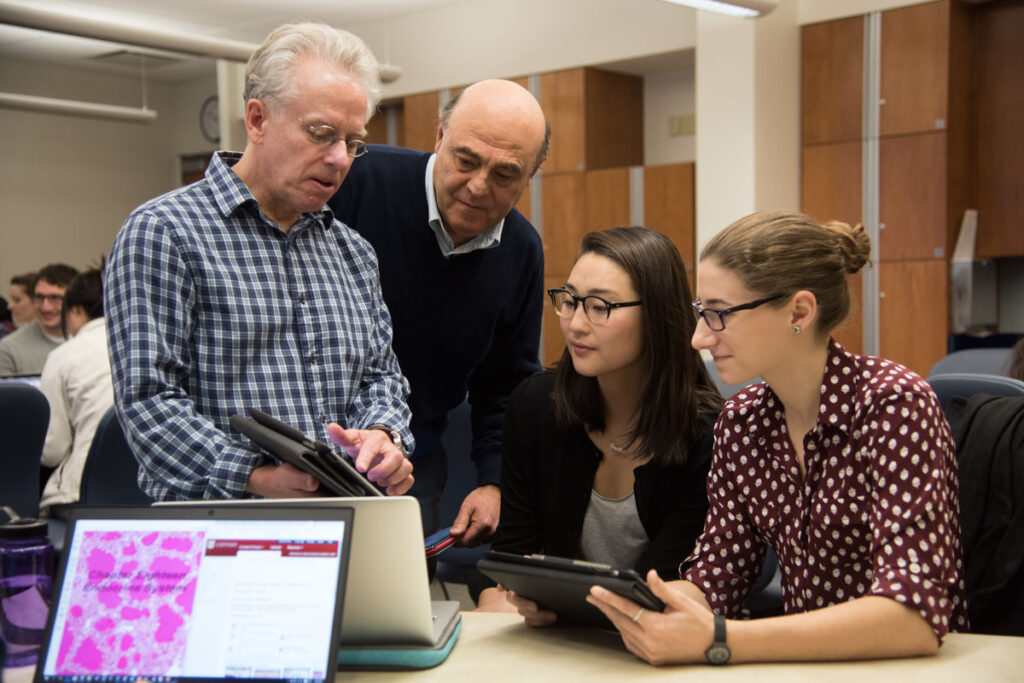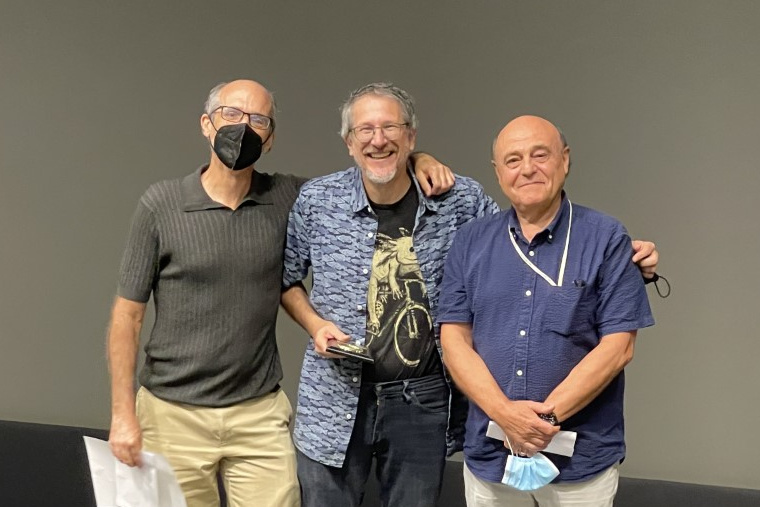The Academy of Educators at Washington University School of Medicine has selected Paul Bridgman, PhD, Professor of Neuroscience and of Bioengineering, and Lawrence Snyder, MD, PhD, Professor of Neuroscience, for the 2022 Lifetime Achievement Award, one of the highest honors faculty can receive at Washington University. They share the award with Megan Wren, MD, Professor of Medicine, and Douglas Char, MD, Professor of Emergency Medicine.
“Receiving the Lifetime Achievement Award from the Academy of Educators reflects the decades of selfless commitment that Drs. Snyder and Bridgman have shown to the students of Washington University School of Medicine,” said Amy Bauernfeind, PhD, Associate Professor and Vice Chair of Education in the Department of Neuroscience. “As a Department, we are thrilled to be able to offer such passionate teaching to the future doctors and neuroscientists that we train.”
The Lifetime Achievement Award was launched in 2021 to honor faculty members who have shown a lifelong commitment to education and demonstrate excellence in one or more domains of educational service, leadership, or scholarship. “Our Department is immensely proud of our educators,” said Linda Richards, PhD, Edison Professor and Chair of the Department of Neuroscience. “The Lifetime Achievement Award from the Academy of Educators is a highly prestigious and fitting accolade to two of our esteemed faculty for their many years of teaching excellence at Washington University.”
Innovation in histology and neuroscience education

Bridgman began teaching at the School of Medicine in 1984. The son of teachers, he valued education from a young age, and shortly after he joined the Department of Neuroscience (then called the Department of Anatomy and Neurobiology) he started teaching graduate students in Neural Techniques and Cellular Neurobiology. Within two years, he began lecturing in the Neuroscience course for medical students and teaching Histology. In 1999, Bridgman took over as course director for Histology and Physiology (renamed Histology and Cell Biology in 2016), and for the next two decades he devoted immense time to training medical students in these fundamentals.
“I liked teaching graduate students, especially on topics related to my research, which has focused on axon guidance and the motility mechanisms used by growth cones during pathfinding,” said Bridgman. “However, I grew to really enjoy teaching histology to medical students, especially the histology labs because of the direct interaction with students.”
Bridgman is lauded for the innovations he made to teaching histology, including introducing novel technology for interactive quizzes—the first medical course to do so for individuals and small groups. He digitized the entire histology slide collection and developed an online microscopy resource through Slide-Atlas.org, which continues to be used in the Gateway Curriculum.
Before the medical school transitioned to the Gateway Curriculum in 2020, Bridgman served on planning committees for two years and, afterward, he continued as an instructor. Throughout his career Bridgman has been recognized for his talents as an educator, including nine Distinguished Teaching Service Awards, a Course Director of the Year Award for Histology and the Samuel Goldstein Leadership Award in Medical Education.

Snyder is a beloved educator who was recently honored with the 2022 Award for Excellence in Teaching by the Neuroscience Community at WashU. From 1997–2021, he was a lecturer in Neural Systems and course director from 2011–2020. “I had lots of great interactions over the years in the Systems Course,” said Snyder. “I liked talking to students after the final exam, hearing about what parts of the class really worked for them, and what parts were more of a struggle. It was terrific feedback.” His responsiveness to students’ input emerged in efforts such as developing the First Year Fundamentals course that addressed their needs in training in statistics and “pico courses” within the Systems Course that allowed students to learn about a particular neuroscience topic in-depth.
Among Snyder’s fondest memories are the years he spent as co-director of the Neuroscience Program with Erik Herzog, PhD, the Viktor Hamburg Distinguished Professor in Arts & Sciences at Washington University. In his letter of support for Snyder’s Lifetime Achievement Award, Herzog wrote that Snyder “shines in his dedication to students. In addition to his cutting-edge research on the neurophysiology of hand-eye coordination, Larry has dedicated himself to being an inclusive leader. For example, Larry instituted ‘Directors’ chats’ where he met with students to informally discuss how they are progressing. This novel approach to creating community and identifying areas for improvement was successful because Larry leads with brilliance and humility.”
Indeed, Snyder said he was surprised when he learned of the award. “I teach for fun, and feel a little sheepish getting an award for it—sort of like how I feel about being paid to do research in my lab!”
The recipients were honored during Education Day from the Academy of Educators on October 11.